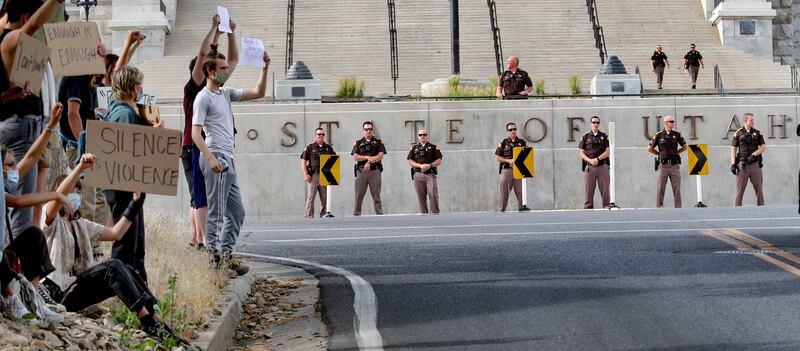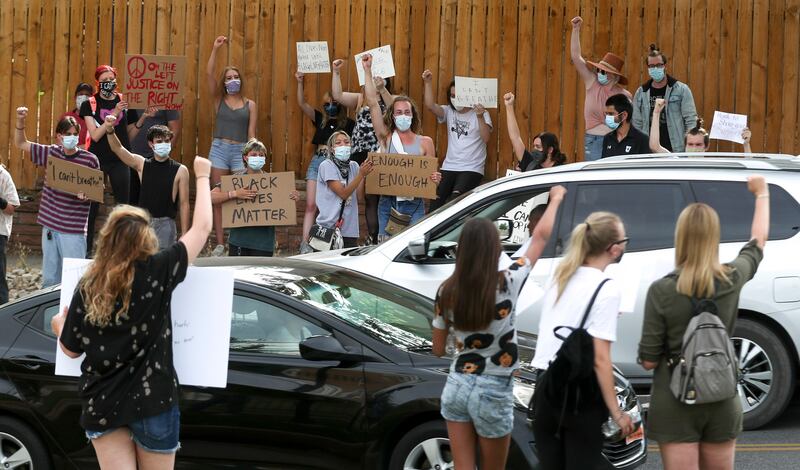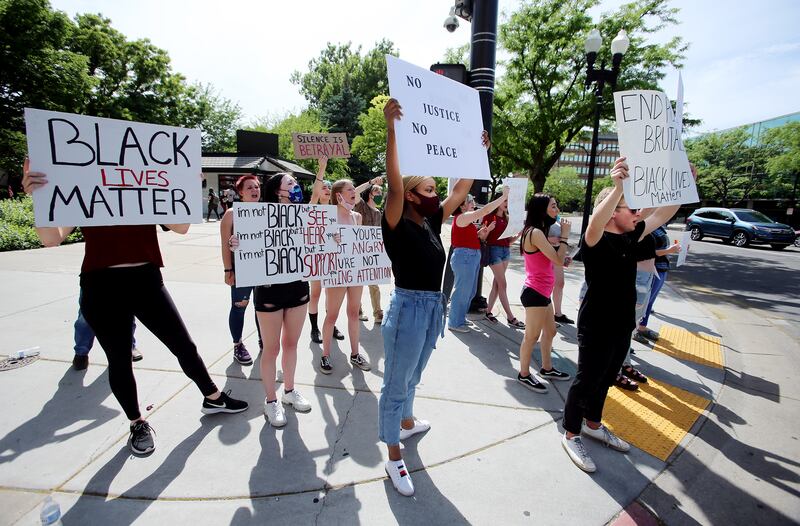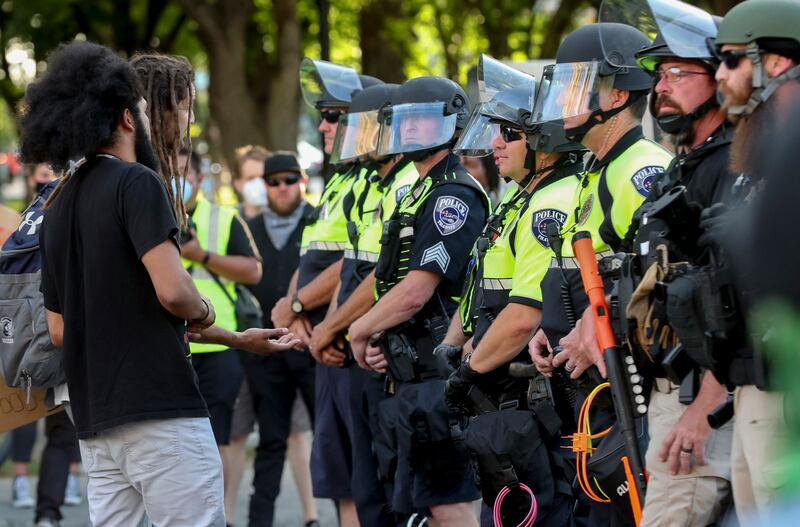SALT LAKE CITY — Protesters met in peaceful groups large and small in multiple Utah cities Tuesday, raising cries for the fourth day in a row against racism and police brutality following the death of George Floyd, an unarmed black man killed by Minneapolis police.
Salt Lake City saw two protests — one near the State Capitol, which began Tuesday afternoon and stretched into the evening, and one at Washington Square, the home of the Salt Lake City-County Building. Both were impromptu and without official organization.
While about 100 people lined the streets near the Capitol, about 300 marched around Washington Square for several hours, stopping for speeches and to interact with police and National Guard soldiers posted by the intersections.
“We are here to unite, not fight,” said Hasson Davis, who addressed the crowd through a megaphone gathered at 400 South 200 East. “I am not an angry black man, but I am fed up.”
Davis said the fear he feels is exhausting.
“I feel like I have PTSD from watching this over and over,” said Davis, who called himself an activist, although he’s not affiliated with any organization. “I never caused harm to nobody, but I see the harm that was done. I have seen the bullet holes. I’ve seen people die. ... I don’t know what’s going to stop it.”
The protests Tuesday night were not organized by a specific group, and people took turns speaking and sharing their thoughts and feelings. One of the more moving moments was when Davis offered his megaphone to a young woman who didn’t want to be identified, but who eloquently explained why the frustration that has boiled over will not recede any time soon.
Black Americans, she said, are tired of being killed while jogging, while smoking, while sleeping, while sitting in their own homes, while playing in parks and walking through neighborhoods.
Tory Quinn Crosby, who is with the Northern Utah Chapter of Black Lives Matter, attended the protest and asked the people of color from the crowd to join her in shaking hands with any police officer or soldier willing. She and others shook hands and talked briefly.
“You guys have been amazing keeping it peaceful the last couple of days,” Crosby yelled through the megaphone. “I had to come out here. ... We are a powerful and strong movement, and we need to stick to that. These officers here are civilians just like us.”
She got emotional as she talked about taking a knee with police and soldiers one street over just before she joined the protest.
“We are not here to destroy our city,” Crosby said.
At one point several people argued with her about whether or not begging police to kneel with them or shake their hands did any good. Crosby was adamant that connecting with officers and soldiers allowed them to see them as human beings — not stereotypes.
“We want to be looked at like normal people. We just want humanity,” she said.
On social media, the Utah National Guard posted a photo of soldiers and Salt Lake City police officers taking a knee with protesters outside of the Salt Lake City Public Safety Building.
Utah Public Safety Commissioner Jess Anderson in turn tweeted his thanks Tuesday night to those who engaged in peaceful protests across the state.
Also in Salt Lake City, a different group of protesters about a 100 strong initially lined each side of State Street leading up to the Capitol, chanting “if you think it’s a joke then you are not woke,” and “hands up don’t shoot.” Cheers arose from the protesters as drivers honked their horns as they cruised past.
At one point the group marched around the Capitol’s grounds, clutching signs and continuing to cheer and chant.
Among them was Mabel Bates, who said Tuesday was her third protest.
“I’m here today to support people of color and use my white body as a barricade maybe if police officers decide to get violent,” Bates said. “I feel like with my white privilege comes a responsibility to protect my fellow human beings.”

Police stood in a line at the front of the Capitol building’s steps, growing in number as the afternoon stretched on. The two groups largely did not interact with one another before 8 p.m., with the exception of several protesters who crossed the street to converse with officers.
One woman sat nearby to sketch the protesters. Others passed out water bottles and masks to those congregating on either side of the street.
Nolan Powe, who is black, said he lives in a predominately white town and has experienced racism and been racially profiled.
“We really want to see a change in our system because black people are still getting racially profiled,” said Powe, who led chants outside the Capitol. “African Americans are still being racially profiled, especially in Utah. I guess me and the crowd would love it if we could get treated equally.”
Powe plans to continue going to protests and spreading awareness.
“I will not rest until George Floyd’s family gets justice and until either President (Donald) Trump condemns the act of the officers and makes right of it or until they simply put this to bed,” he said.
The crowd dispersed peacefully at about 8:10 p.m. when police crossed the street and told them they needed to leave for the night because of Salt Lake City’s curfew, put in place this week following destructive riots over the weekend. Before leaving, protesters called for the officers to take a knee with them, their cries intensifying as police crossed the street.

A peaceful group also assembled in Logan.
In Ogden, about 20 teens and young adults held signs near City Hall on the corner of 25th and Washington Boulevard Tuesday afternoon, chanting “Black Lives Matter” and “no justice, no peace.” Several drivers honked their horns and raised their fists in solidarity as they passed.
According to Sierra Rose, one of the organizers, the youth wanted their protest to be peaceful, so she was encouraging participants to disengage with anyone who tried to antagonize them. Rose said she attended a rally on Sunday that was met with vitriol by passersby.
The group saw opposition Tuesday, but protesters instead turned their attention to chanting or cheering.
Rose said she doesn’t want their message of justice for Floyd and solidarity within her community to be lost in the screaming and fighting that can happen at protests.

The group of protesters ranged in age from 15 to 21. Rose said teens are often excluded from these movements because people think they only show up to take pictures for their social media.
Brevan Benard, another organizer, echoed what Rose said, saying he wanted to protest peacefully and give a voice to the youth in the community who were frustrated with policing too.
“We believe in change; we came here to motivate and inspire people to not just protest, but to come and do it peacefully,” he said. “We as kids are the next generation.”
In Orem, passersby swelled the ranks of what began as a small, honk-and-wave-style protest on the corners of State Street and University Parkway near the University Place Mall. Four men in their 20s said they had been driving around Provo and Orem with signs in their car, looking to join a protest.
Juliana Cassiano, 30, of Provo, led call-and-response chants on one corner, yelling “Whose lives matter? Black lives matter!” and “I can’t breath!”
“This is a remarkable moment when people have decided to talk about this issue all over the country, so we have a responsibility to educate people about how we’ve lived with so many years of injustice. This is a great moment.”








The protest’s organizer was a 21-year-old Utah Valley University student who gave only her first name, Natasha. She stood on one corner alone at 1:30 p.m., but by 7 p.m. there were more than 70 people carrying signs in the crosswalks and yelling on all four corners. She told each person who joined they had to be civil, lawful and nonviolent.
“The people here realize there is a serious injustice happening and a need for reform,” she said. “We’re all standing here in solidarity for George Floyd and for all other victims of police brutality and white supremacy who have gotten no justice.”
Hundreds of cars honked in support of the protest, fueled by signs like “Honk if black lives matter.”
One man yelled, “Trump 2020” at the protesters from his car in a left turn lane, then flipped them off as he drove past.
A verbal skirmish broke out when Hayden Hansen and his father, Tyler, who are white, walked over from Texas Roadhouse and told some of the white protesters that all lives matter.
“In my opinion, their lives do matter, but mine matters just as much,” said Hayden Hansen, who would like to be a police officer.
The father and son were frustrated when a couple of protesters told them to leave.
“We weren’t for (George Floyd) getting killed,” Tyler Hansen said. “I thought that was savage, but these protesters need to know the statistics; cops kill more white men than black men.”
Asked if that held true based on the percentage of people of those races in the U.S. population, Hansen said he would look it up.
Police encouraged people to go home and leave the city streets at curfew, but they didn’t begin actively enforcing it until about 9 p.m. About 50 people continued protesting, walking partway to the Capitol before turning around and heading south on State Street. Police blocked off streets as they marched in north bound lanes and adjacent sidewalks.








